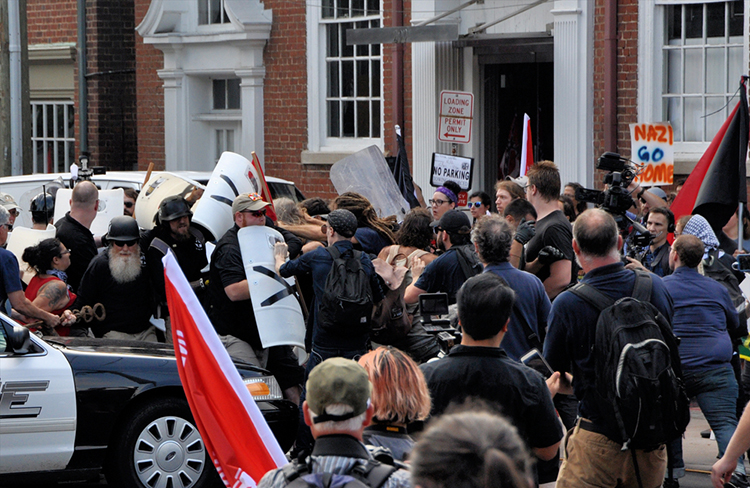Judge orders Discord app to reveal identity of woman accused of encouraging Charlottesville violence

White nationalists and counterprotesters clash in during the 2017 rally in Charlottesville, Virginia, that turned violent. Kim Kelley-Wagner / Shutterstock
A federal magistrate judge in San Francisco has ordered an anonymous messaging app to release the identity of a woman accused of helping plan violence at the white supremacist rally in Charlottesville last August.
Chief U.S. Magistrate Judge Joseph Spero on Monday refused to quash a subpoena for the information in a suit filed against rally organizers and participants, report NPR, the Associated Press, Courthouse News Service and the Washington Post.
The woman is identified as “Jane Doe” in the lawsuit and kristall.night on the app, an apparent reference to Kristallnacht violence instigated by the Nazis in 1938.

Roberta Kaplan. ABA Journal file photo by Len Irish
In leaked chats, the woman made racist comments and advised using flagpoles as spears and clubs during the rally. She argued the First Amendment protected her right to anonymous speech and association.
Spero ruled the woman had the right to challenge the subpoena on her behalf, but not on behalf of other app users. He found that woman’s right to anonymity was outweighed by the plaintiffs’ interest in her identity. He noted that a protective order provides a safeguard against improper use of Doe’s information. The order restricts release of the information to lawyers and a few other people.
Spero ruled, however, that the Stored Communications Act protects the content of the communications, absent permission by the sender or the recipient. One of the lawyers for the plaintiffs, Roberta Kaplan, told NPR she has the needed permission.
The suit alleges negligence, conspiracy, harassment, infliction of emotional distress, assault and violation of two federal laws—the Ku Klux Klan Act of 1871 and the Civil Rights Act of 1866. The plaintiffs are nine people who same they were injured emotionally and physically by the rally.
Discord had shut down the accounts associated with the Charlottesville rally after a paralegal protesting the white supremacists was killed at the rally.



